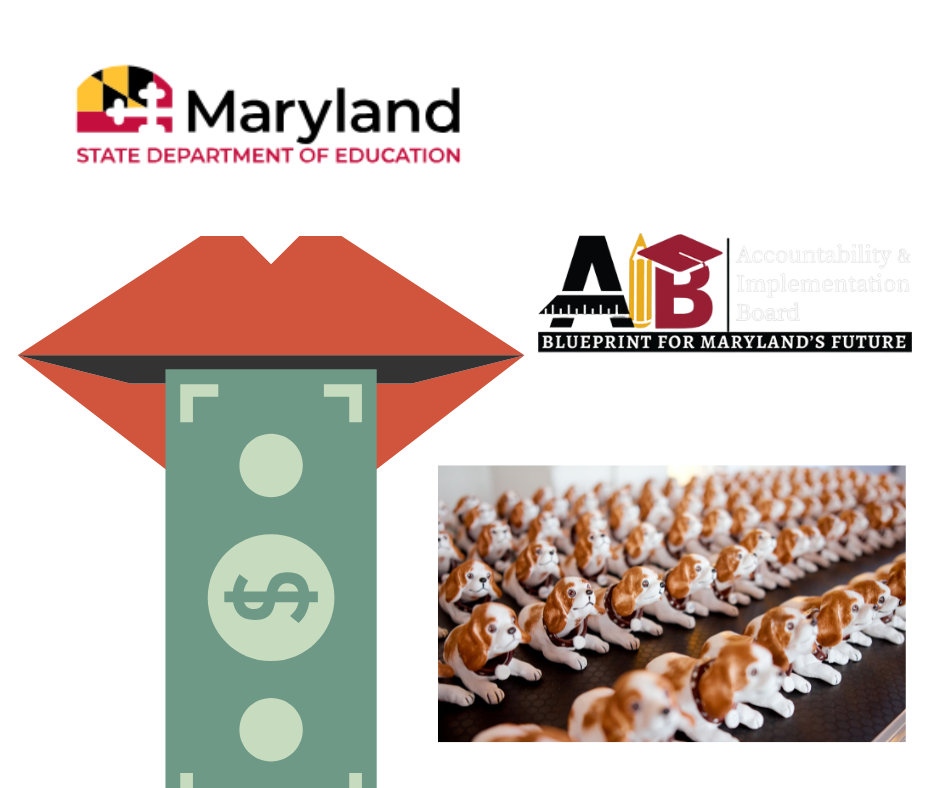
Please Follow us on Gab, Minds, Telegram, Rumble, GETTR, Truth Social, Twitter
If I had to guess about how much the staff at the Maryland State Department of Education had contact with real teachers in real classrooms in real schools, I would have to say "none " after watching the Tuesday, January 28th joint meeting between MSDE, the Maryland State Board of Education and the Accountability and Implementation Board for Maryland's Blueprint for the Future.
As a retired teacher, I hear from active teachers regularly. They call me to talk about what is going on in their local school system and how things are going in their career. It's always interesting to hear how some things have changed and how some have stayed the same.
One thing that has changed is that teaching has become more difficult. When I taught the problems were with some of the students, some of the administrators, paperwork and some of the parents. But most of the people were great and the paperwork was something we learned to manage.
It's not that way anymore. Teachers tell me about students who are disengaged, disorderly, and, in some cases, dangerous to other students, to teachers and to themselves. They talk about administrators who either don't respond to discipline calls or respond by taking students out of the classroom for a few minutes, giving them some candy and a good "talking to" and sending them back. No consequences and the student goes back to the class they had just disrupted. Occasionally, these students are taken to their social worker or a local school psychologist before they are sent back.
This is all part of "restorative discipline" a strategy that has not only proven ineffective but, in some cases, dangerous.
Some discuss the fact that they teach classes where many don't speak English. And the teachers don't speak the languages of their students.
Quite a few talk about getting out of the profession. They also talk about how most of the young people they talk to wouldn't dream of being a teacher. Kids are not dumb. They don't want to deal with disruptive, violent students.
One thing they DON'T discuss is that the pay isn't good enough. In fact, many say that they enjoy getting paid to work for ten months out of the year and having holidays and summers off.
So as I listened to MSDE and the AIB discuss teacher recruitment, development and retention, it was clear they are not paying attention to the real problem. They started discussing the problem:

This slide and the others after it were from the meeting. As you can see, this year Maryland school districts reported 1,600 vacancies statewide. Ten percent of the positions filled were filled by conditionally licensed teachers meaning they aren't certified.
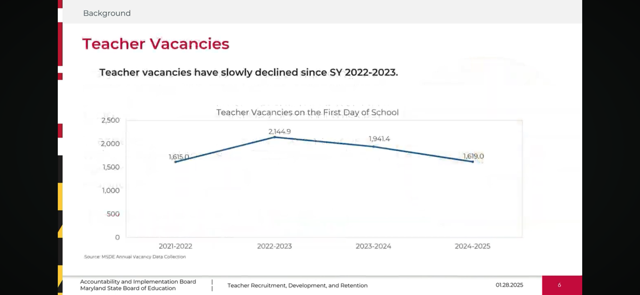
The good news, according to MSDE, is that vacancies have declined.
That's probably because the number of conditionally licensed teachers has increased.
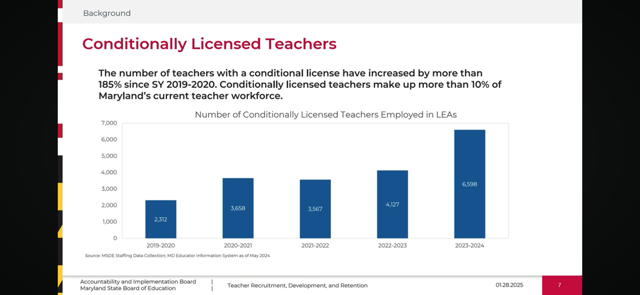
In an effort to make the statistic seem palatable, they stated that conditionally licensed teachers are "more diverse." Hardly a positive note. It's like a rental business saying to customer, "Most of our cars aren't working but hey, at least they are different makes and models."
They even take the time about the fact that most conditionally licensed teachers, over 50%, are African American. They call that diversity. Would they call it diversity if those 50% were white? It's a valid question.
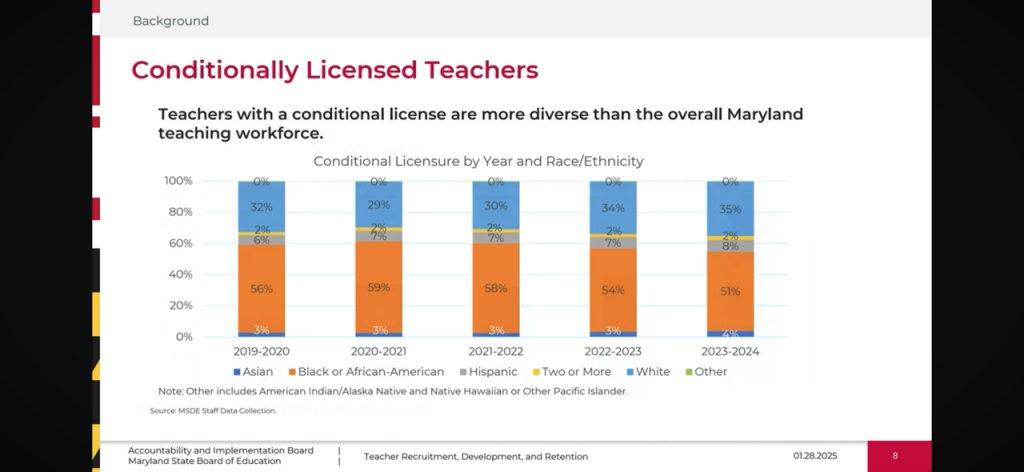
Participation in teacher preparation programs is approximately 1900 less than 2013 levels.
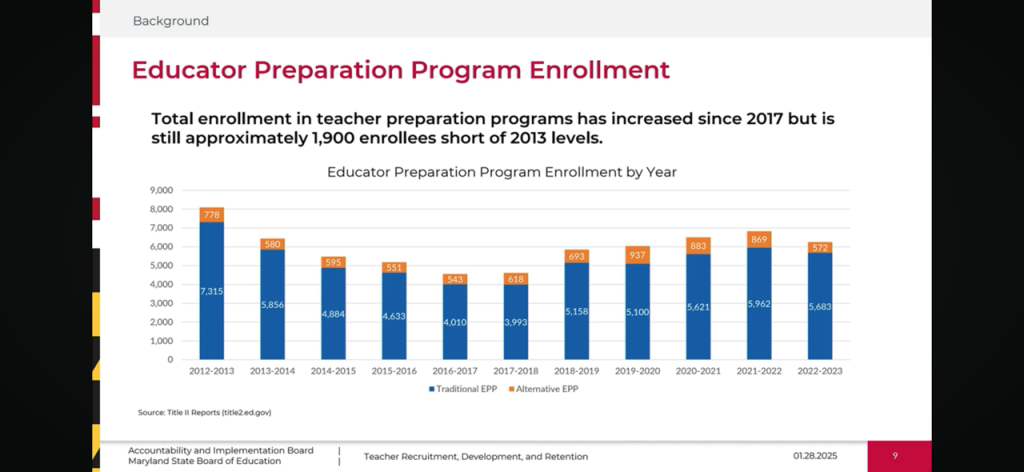
Never fear though because MSDE has some creative, new, imaginative ideas.
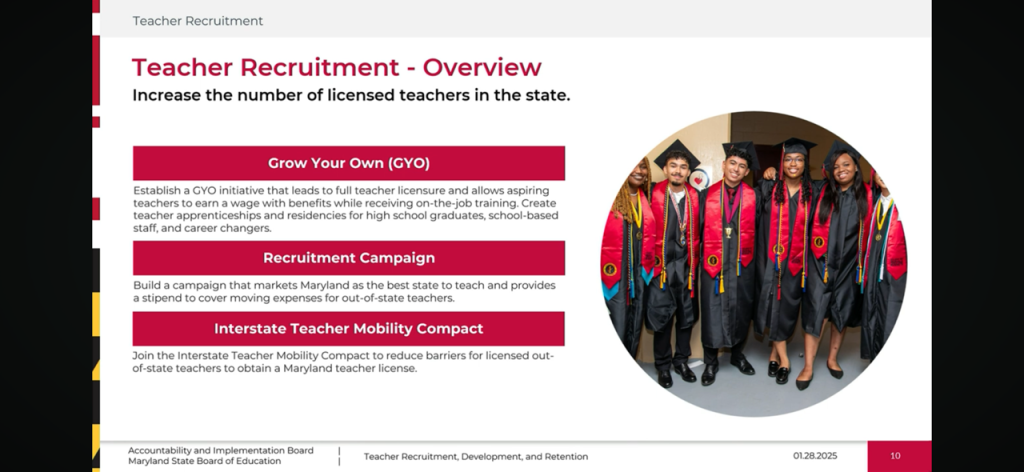
The most ridiculous part of the strategies above is that MSDE claims that Maryland is known as a "great state to teach in." I am not sure who these staff members are talking to, but most of the teachers leaving who I know are making their way to more conservative states or to lower paying private schools where the working conditions are so much better.
The ideas themselves are not bad. "Grow Your Own" is a great way to get students interested in teaching. It doesn't work as a way to keep them in teaching.
The Recruitment Campaign is designed to "build a campaign" that says that Maryland is the "best state to teach" while it provides a stipend for moving expenses for out of state teachers. While a moving stipend is great, every other state is doing something similar. And, just saying that Maryland is the best state to teach doesn't make it true. All a teacher in another state needs to do is look at our terrible test scores and juvenile justice debacle to see the truth.
The Interstate Teacher Mobility Contract is something Governor Moore talks about in his bill to "pause" the Blueprint for Maryland's Future. He's going to convene a committee to study it. That should be costly in both time and money. We see no problem in allowing certifications from other states to be valid, but the state better be ready to carefully vet these prospective teachers who wish to move from one state to another without a valid reason such as a spouse changing jobs or assignments, etc. Sometimes a teacher NEEDS to leave a state because they are incompetent or worse.
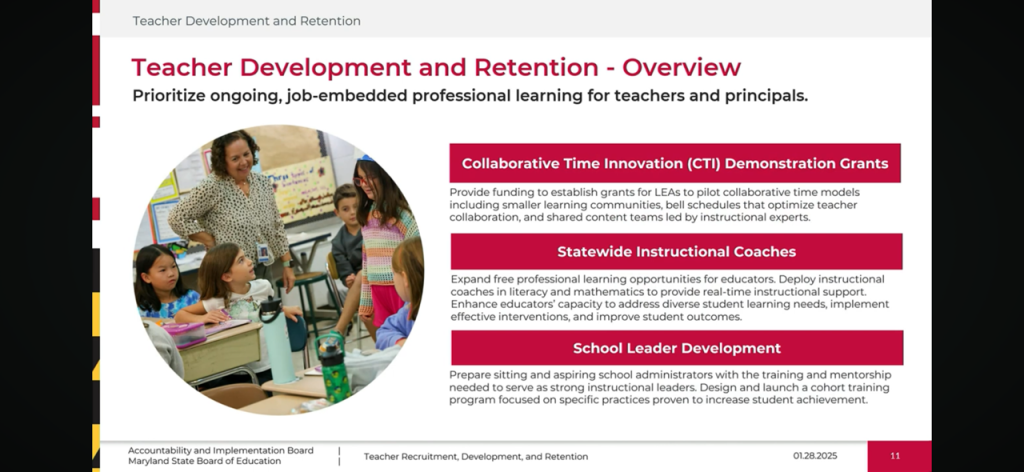
The last three ideas are decent ideas but have been tried before. In fact, the Collaborative Time Innovation was one of the few parts of the Blueprint that made sense. Dr. Kirwan, the namesake of the Kirwan Initiative reminded the two committees that this was an idea that they got from successful school districts when they were researching how to improve Maryland schools.
Of course, that idea was scrapped by the Governor in his Blueprint pause.
The third idea is laudable but is logistically expensive and ungainly. Deploying instructional coaches in literacy and mathematics to provide real-time instructional support to teachers will be expensive and difficult to schedule. Coaches cost money whether the State or the local provides them. Maryland has approximately 63,000 teachers spread out among all the counties and Baltimore City. Even if the support is provided during summer when teachers are off, all staff will have to be paid.
Instructional coaches won't help if the teachers can't teach because of uncontrollable students.
That makes the idea about training administrators the most practical if the state was fully committed to it.
The biggest complaint I hear from teachers across the state is that students are out of control and that administrative staff in their schools are useless in correcting the problem. As stated earlier, when administrators are asked to handle the most disruptive students in classrooms, they either don't show up or don't discipline the students. As we have seen in recent years, juveniles are given extensive leeway via state legislation to break the law and get away with it, even if their acts are violent. Teachers and other students lose hope of ever gaining control of their classes and actually teaching and learning. Administrators have their hands tied by ridiculous mandates from MSDE and the State legislature.
Teaching and developing new administrators is part of the solution to the teacher shortage, but without giving administrators the actual power and ability to control their schools, it's just lip service.
The only glimmer of hope in the session came from a current teacher who holds National Board Certification, Justin K. Robinson. He was appointed in May of 2023 and is the only teacher on the AIB. Robinson stated the problem very clearly. He told the group that until schools are positive, safe workplaces, it will be very difficult to recruit and retain teachers. He's right. They should listen to the teacher!
The members of the two committees, like little bobble head dolls,nodded their heads and moved on.
Sadly, no one seemed to be listening. What education bureaucracy does best is talk about small problems and ignore the critical, bigger problems. Then they ask money to ignore what works and implement what doesn't.
It's clear that these groups don't want to solve the problem because they can make money if the schools remain bad or get worse. It's how they get to spend money on new administrative positions, new programs, new committees to study and admire problems, etc. It's how they support the schools doing every job but the one they should be doing, providing academic instruction and improving student learning.
It's how they give lip service and throw money into the bottomless pit that is "school improvement."